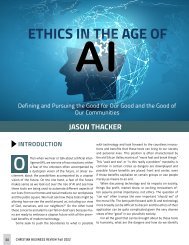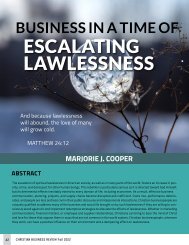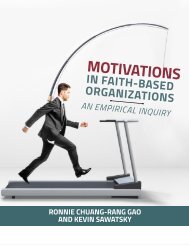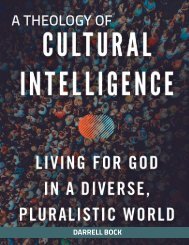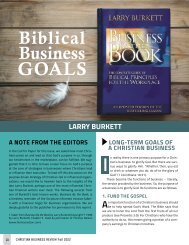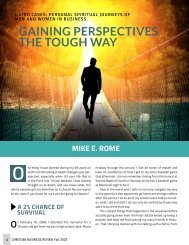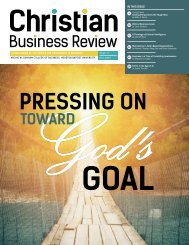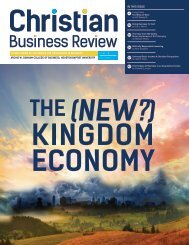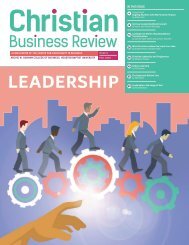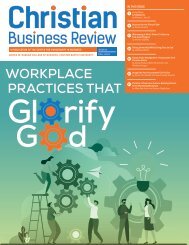Christian Business Review 2018: Kingdom Business in the Brave New World (Issue 7)
You also want an ePaper? Increase the reach of your titles
YUMPU automatically turns print PDFs into web optimized ePapers that Google loves.
WISDOM<br />
AI is also be<strong>in</strong>g used to create customized learn<strong>in</strong>g for<br />
<strong>in</strong>dividual students <strong>in</strong> <strong>the</strong> educational system. A diagnosis<br />
of a student’s strengths and weaknesses at a designated<br />
grade level can assist <strong>in</strong> customiz<strong>in</strong>g content for maximum<br />
learn<strong>in</strong>g and educational progress. However, AI can<br />
also be used to program students with respect to values,<br />
ethics, and moral content. The issue of whose values <strong>the</strong>n<br />
become embedded <strong>in</strong> educational programs is of significance<br />
for <strong>Christian</strong> parents. Although questions regard<strong>in</strong>g<br />
whose values are taught <strong>in</strong> <strong>the</strong> classroom are not new<br />
nor necessarily related to technology, certa<strong>in</strong> aspects of<br />
technology—for example, <strong>the</strong> widespread scope of technological<br />
reach and <strong>the</strong> rapid pace of new technology<br />
adoptions—may make <strong>the</strong> problem more acute and more<br />
resistant to ethical concerns and adjustments.<br />
In <strong>the</strong> arena of social media, Facebook has suffered a<br />
PR backlash stemm<strong>in</strong>g from its failure to protect <strong>the</strong> privacy<br />
of 50 million Facebook users (and by extension <strong>the</strong><br />
privacy of all <strong>the</strong>ir Facebook “friends”) because Facebook<br />
shared its data with Cambridge Analytica and neglected<br />
to monitor how <strong>the</strong> third-party used that data. 7 Accord<strong>in</strong>g<br />
to Christopher Wylie, a data scientist at Cambridge<br />
Analytica, <strong>the</strong> usage of <strong>the</strong> Facebook data to target voters<br />
<strong>in</strong> <strong>the</strong> 2016 presidential election was a “grossly unethical<br />
experiment.” 8 He admits that Cambridge Analytica engaged<br />
<strong>in</strong> message target<strong>in</strong>g to specific voter groups based<br />
on choos<strong>in</strong>g ideas to which <strong>the</strong>y would be susceptible,<br />
<strong>in</strong>clud<strong>in</strong>g fram<strong>in</strong>g, topics, tone, and various fear appeals.<br />
He fur<strong>the</strong>r states that Cambridge Analytica is a “fullservice<br />
propaganda mach<strong>in</strong>e.” 9 In this way, news items,<br />
op<strong>in</strong>ion editorials, blogs, advertis<strong>in</strong>g, and o<strong>the</strong>r k<strong>in</strong>ds of<br />
<strong>in</strong>formation sources were selectively fed to certa<strong>in</strong> target<br />
audiences to re<strong>in</strong>force and even <strong>in</strong>tensify <strong>the</strong>ir predispositions,<br />
while block<strong>in</strong>g content that might provide a more<br />
balanced po<strong>in</strong>t-of-view.<br />
These are just a few examples of challenges be<strong>in</strong>g<br />
wrought by technology that call for advances <strong>in</strong> ethical<br />
th<strong>in</strong>k<strong>in</strong>g with<strong>in</strong> <strong>the</strong> bus<strong>in</strong>ess community. Just as <strong>the</strong><br />
Industrial Revolution resulted <strong>in</strong> changes to child labor<br />
laws, so <strong>the</strong> current revolutions tak<strong>in</strong>g place <strong>in</strong> technology<br />
portends a more thoughtful approach to technology<br />
implementation than simply, “If we can do it, we should<br />
do it.” Ir<strong>in</strong>a Raicu, who works at an ethics center <strong>in</strong> Silicon<br />
Valley, contends that although both law and ethics have<br />
some difficulties catch<strong>in</strong>g up with technology, <strong>the</strong> problem<br />
is not <strong>in</strong>surmountable. “Many technologists . . . are not<br />
encouraged to conduct that analysis, even superficially.<br />
They are not even taught to spot an ethical issue—and<br />
some (though certa<strong>in</strong>ly not all) seem surprised when<br />
backlash ensues aga<strong>in</strong>st some of <strong>the</strong>ir creations.” 10 For<br />
<strong>the</strong>se reasons, more and more technology experts are call<strong>in</strong>g<br />
for ethics awareness and ethics tra<strong>in</strong><strong>in</strong>g <strong>in</strong> <strong>the</strong> context<br />
of emerg<strong>in</strong>g technologies. 11<br />
Ethics tra<strong>in</strong><strong>in</strong>g has been found to improve employees’<br />
sensitivity to ethical issues and companies’ will<strong>in</strong>gness<br />
to concern <strong>the</strong>mselves with “do<strong>in</strong>g <strong>the</strong> right<br />
CBR PEER REVIEWED ARTICLES<br />
th<strong>in</strong>g.” 12 Therefore, an <strong>in</strong>crease <strong>in</strong> ethics tra<strong>in</strong><strong>in</strong>g programs<br />
for technologists is one way of rais<strong>in</strong>g awareness and<br />
heighten<strong>in</strong>g sensitivity to ethical issues. O<strong>the</strong>rs suggest a<br />
code of ethics to govern all <strong>in</strong>ternet content. 13 The advantage<br />
of a common code of ethics would be standards that<br />
are known by all content purveyors; but <strong>the</strong> disadvantage<br />
is that a one-size-fits-all approach <strong>in</strong>variably advantages<br />
some bus<strong>in</strong>ess models over o<strong>the</strong>rs and often fails to fit<br />
some bus<strong>in</strong>ess’s circumstances. Additionally, numerous<br />
ethical situations arise from o<strong>the</strong>r types of technological<br />
advance besides <strong>in</strong>ternet technology, such as those already<br />
mentioned that confront <strong>the</strong> medical profession.<br />
Although <strong>the</strong>se and o<strong>the</strong>r suggestions help provide a<br />
way forward, <strong>the</strong>y often do not answer <strong>the</strong> most important<br />
ethical questions—questions that depend upon one’s<br />
value system for resolution. Some examples might be:<br />
•“If our company is more profitable us<strong>in</strong>g practices<br />
that violate privacy, why shouldn’t we<br />
use those practices? Maybe society needs to<br />
change. After all, I’m maximiz<strong>in</strong>g shareholder<br />
value.”<br />
•“If it isn’t illegal, <strong>the</strong>re is noth<strong>in</strong>g to stop us from<br />
do<strong>in</strong>g it.”<br />
•“If I can conceive of an <strong>in</strong>novative technology,<br />
who’s to say I shouldn’t develop that technology?”<br />
•“Human workers are like our mach<strong>in</strong>es; our job<br />
is to make operations as efficient as possible.<br />
When a mach<strong>in</strong>e becomes obsolete and cannot<br />
do <strong>the</strong> job efficiently, we replace it. We should<br />
do <strong>the</strong> same with people that are obsolete.”<br />
The press for a moral compass that will help society<br />
grapple successfully with such problems surpris<strong>in</strong>gly has<br />
led some to call for a return to religion. For example, one<br />
author writes, “Here’s where science comes up short. The<br />
answers can’t be gleaned from any social data set . . . But<br />
<strong>the</strong>y just might be found <strong>in</strong> <strong>the</strong> Bible. And <strong>the</strong> Koran, <strong>the</strong><br />
Torah, <strong>the</strong> Bhagavad Gita, and <strong>the</strong> Buddhist Sutras. They’re<br />
<strong>in</strong> <strong>the</strong> work of Aristotle, Plato, Confucius, Descartes, and<br />
o<strong>the</strong>r philosophers both ancient and modern.” 14 In light of<br />
<strong>the</strong> history of human conduct, surely one must be forgiven<br />
for th<strong>in</strong>k<strong>in</strong>g this approach might be unwieldy at best and<br />
disastrous at worst, rely<strong>in</strong>g <strong>in</strong> some cases on mutually<br />
contradictory belief systems. Still, Holmes is correct that<br />
ideas such as <strong>the</strong> “Golden Rule and <strong>the</strong> sacredness of life<br />
to <strong>the</strong> value of honesty and virtues of generosity” 15 represent<br />
commonalities on which most can agree and which<br />
might be a good start<strong>in</strong>g place.<br />
Never<strong>the</strong>less, for important moral questions, such as<br />
those above and o<strong>the</strong>rs like <strong>the</strong>m, <strong>Christian</strong>s can br<strong>in</strong>g<br />
a unique perspective to <strong>the</strong> identification, analysis, and<br />
implementation of measures to act more ethically that is<br />
grounded <strong>in</strong> <strong>the</strong> wisdom found <strong>in</strong> <strong>the</strong> Scriptures. Because<br />
<strong>the</strong> character of God constitutes <strong>the</strong> basis for morality,<br />
24<br />
CHRISTIAN BUSINESS REVIEW fall <strong>2018</strong>




